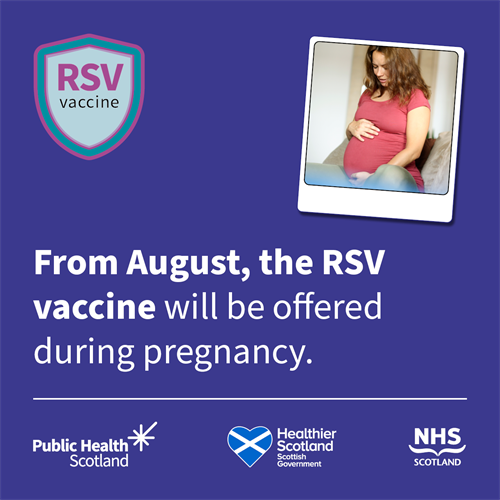
Key contact
Click on the following links to find out more about the RSV vaccination programme:
RSV vaccine during pregnancy | NHS inform
Your midwife will be happy to answer any questions you might have about vaccines offered to you during pregnancy.
The RSV vaccination programme is available to pregnant women all year round.
What is RSV?
RSV, also known as Respiratory Syncytial Virus, is a common respiratory illness that affects the airways and lungs. RSV generally causes mild illnesses with cough and cold like symptoms, it can also make your baby wheezy or short of breath.
RSV affects people of any age; however, it can be especially serious for some newborn babies.
Most babies recover after two or three weeks, but RSV can cause serious illnesses such as bronchiolitis (infection of the small airways of the lungs), pneumonia (infection of the lungs) or other life-threatening conditions, leading to complications or hospitalisation. Worldwide, RSV is a major cause of infant mortality and is the cause of up to 20 to 30 deaths per year in the UK.
Having the recommended vaccines during pregnancy is the best way of protecting your baby from serious illnesses.
RSV infections in babies can include:
- A runny or blocked nose
- Breathing difficulties, fast, noisy and wheezing
- Difficulty feeding
- Cough or barking cough (croup-inflammation of the upper airways)
- Fever
- Unsettled, agitated, or difficult to comfort
- Tiredness or lethargy
- Ear infections
You can catch the RSV virus at any time of the year, but cases do increase over winter and early spring.
Eligibility
If you are pregnant, you will be offered the RSV vaccine from 28 weeks into your pregnancy. This reduces the risk of passing an RSV infection on to your newborn baby and means that your baby will be protected even if they are born early.
If you didn’t have the RSV vaccine at your 28 week appointment, you can get the vaccine later in your pregnancy. It will still protect you and reduce the risk of spreading RSV infection to your newborn baby.
The RSV vaccine is also offered to older adults aged 75-79 years. Click on the following link for more information on our adults programme RSV adults or watch the video What to expect at your RSV appointment (adults).
Getting the vaccine
You will be offered an RSV vaccination, by your midwife, at your 28-week appointment, or later if you are more than 28 weeks into your pregnancy. You midwife will be happy to discuss the process with you and answer any questions you might have about the vaccine.
Clinic locations
Clinics are held at various locations across the Borders. Your 28-week appointment letter with your midwife will include details of where you need to go to.
RSV vaccine
The Pfizer Abrysvo vaccine will be used for the RSV programme. This is not a live vaccine and does not cause RSV infection.
Studies have shown that the RSV vaccine is very safe for pregnant women and their unborn baby. In a clinical trial of almost 4000 women, the vaccine had a high safety record and has now been approved by medicine regulators in the UK, Europe and the USA. Thousands of pregnant women have had the vaccine in national programmes, including more than 1000,000 women in the USA, with no safety concerns reported.
All vaccines are thoroughly tested in advance of use, for safety and effectiveness and continue to be monitored once in regular use.
Globally, RSV infects up to 90% of children within the first 2 years of life and frequently reinfects older children and adult. It is much safer for pregnant women to have the vaccine than to risk your newborn catching the RSV infection.